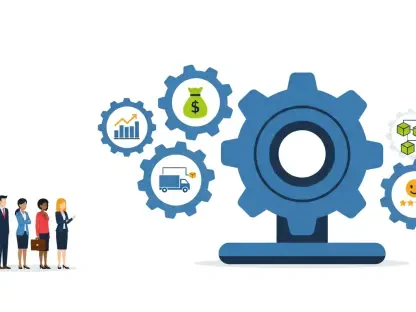In a world where enterprise software is undergoing a seismic shift, imagine a business environment where AI doesn’t just assist but independently drives decisions, streamlines workflows, and anticipates customer needs before they even arise. This is no longer a distant vision but a tangible reality in 2025, as agentic AI—autonomous systems capable of self-directed action—reshapes how companies operate. Salesforce, a titan in customer relationship management (CRM), stands at the forefront of this transformation, leveraging its deep industry roots to pioneer solutions that promise to redefine productivity. This report delves into Salesforce’s strategic maneuvers, financial fortitude, and innovative offerings, exploring how the company is positioning itself as a leader in this revolutionary wave of technology.
The Rise of Agentic AI in the Enterprise Software Landscape
The enterprise software industry is experiencing a profound evolution, driven by the rapid adoption of generative and agentic AI technologies. These advancements mark a departure from traditional tools, introducing systems that can autonomously handle complex tasks, from data analysis to customer engagement. As businesses increasingly prioritize efficiency and scalability, the integration of AI-driven solutions has become a cornerstone of operational strategy, fundamentally altering the competitive dynamics of the market.
Salesforce, long recognized as a dominant force in CRM, has strategically pivoted toward autonomous AI systems to maintain its edge. Building on a legacy of cloud-based innovation, the company has embraced agentic AI to enhance its offerings, moving beyond mere data management to proactive decision-making tools. This shift reflects a broader recognition of AI’s potential to transform customer interactions and internal processes, cementing Salesforce’s role as an industry pacesetter.
Amid this landscape, key competitors like Microsoft and ServiceNow, alongside a wave of AI-native startups, are also vying for market share. While established players bring robust infrastructure, emerging firms offer agility and niche innovations, intensifying the race for AI dominance. The growing significance of AI-driven solutions is evident as businesses demand tools that not only react to inputs but anticipate needs, pushing the entire sector toward a future where automation is integral to success.
Salesforce’s Strategic Push into Agentic AI
Innovative Offerings and Market Trends
At the heart of Salesforce’s strategy lies Agentforce, a flagship agentic AI solution launched in 2024, designed to autonomously manage tasks such as lead prequalification and marketing optimization. This platform empowers businesses to delegate intricate processes to AI, reducing human intervention while maintaining precision and efficiency. Agentforce exemplifies how Salesforce is harnessing cutting-edge technology to meet the evolving demands of enterprise clients.
This innovation aligns with broader industry trends shifting from reactive tools to proactive systems. Customer expectations have evolved, with companies now seeking automation that anticipates challenges and delivers tailored solutions in real time. Market projections underscore this momentum, estimating the agentic AI sector to reach $31 billion in value by the current year, with an annual growth rate of 32%, signaling robust demand for such transformative technologies.
The implications of these trends are far-reaching, as enterprises increasingly view AI not as a luxury but as a necessity for staying competitive. Salesforce’s ability to integrate autonomous capabilities into its ecosystem positions it favorably to capitalize on this shift. By focusing on user-centric design and scalability, the company is addressing the growing need for seamless, intelligent systems that drive measurable outcomes.
Financial Performance and Growth Potential
Salesforce’s financial resilience provides a strong foundation for its AI ambitions, as evidenced by its recent performance metrics. In the second quarter of the current year, the company reported revenue of $9.33 billion, reflecting an 8.4% year-over-year increase, alongside an impressive operating margin of 32.8%. Additionally, a total shareholder return of 23.26% over the past three years highlights its consistent value delivery to investors.
Looking ahead, projections suggest significant growth fueled by AI-driven offerings. Analysts anticipate that platforms like Service Cloud could generate $9.7 billion in revenue by 2027, while overall revenue growth is expected to accelerate from 8% to 12% annually. These figures indicate that Salesforce is not merely sustaining its position but actively expanding its market influence through strategic innovation.
This financial outlook is bolstered by Salesforce’s ability to adapt to economic fluctuations while investing in future-focused technologies. The company’s improved margins and revenue trajectory suggest a capacity to balance short-term profitability with long-term R&D commitments. Such stability is crucial in an era where AI development demands substantial resources and foresight.
Challenges in the Agentic AI Arms Race
The competitive landscape for agentic AI is fiercely contested, with Salesforce facing significant pressure from rivals like Microsoft, which offers Copilot, and ServiceNow, alongside a host of agile startups. Each competitor brings unique strengths, from Microsoft’s vast ecosystem to the specialized focus of newer entrants, challenging Salesforce to continuously innovate to maintain its leadership.
Beyond competition, technological and integration hurdles pose substantial risks. Data infrastructure bottlenecks, for instance, can impede the scalability of AI solutions, while ensuring seamless adoption across diverse enterprise environments remains a complex task. These challenges threaten to slow deployment timelines and impact the effectiveness of Salesforce’s offerings if not addressed proactively.
To counter these obstacles, Salesforce has adopted strategies such as targeted acquisitions and ecosystem development. By acquiring complementary technologies and fostering a robust partner network, the company aims to enhance its data handling capabilities and ease integration pain points. These efforts are critical to sustaining its competitive edge and ensuring that its AI solutions remain accessible and impactful for a wide range of clients.
Navigating the Regulatory and Ethical AI Landscape
As AI becomes ubiquitous in enterprise software, the regulatory environment is evolving to address concerns around data privacy and security standards. Governments and industry bodies worldwide are implementing stricter guidelines to ensure that AI deployments do not compromise sensitive information or user trust. This dynamic landscape requires companies like Salesforce to stay ahead of compliance demands while innovating.
Salesforce has demonstrated a commitment to ethical governance by prioritizing trust through explainable AI, ensuring transparency in how decisions are made by its systems. The company also anticipates a shift toward greater CEO-level oversight of AI strategies by 2027, reflecting a broader trend of executive accountability. Such foresight positions Salesforce as a responsible leader in the space, aligning its practices with emerging standards.
Compliance not only shapes industry practices but also influences customer confidence. Salesforce’s customer-centric approach, which emphasizes secure and ethical AI use, aligns closely with regulatory expectations, fostering trust among its user base. By embedding these principles into its offerings, the company is well-prepared to navigate the complexities of a tightly regulated future while maintaining its focus on innovation.
Future Outlook: Salesforce’s Role in Shaping AI-Driven Enterprises
The trajectory of agentic AI in enterprise software points to a future where autonomous systems become the backbone of business operations. Salesforce is poised to redefine CRM through tools that integrate ambient analytics, such as those embedded in Slack, enabling real-time insights and decision-making. This evolution could fundamentally alter how companies interact with data and customers, setting new industry benchmarks.
Emerging opportunities in data governance, hybrid AI solutions, and multi-agent orchestration for complex workflows present additional avenues for growth. Salesforce’s investment in these areas suggests a vision of AI that transcends single-task automation, aiming instead for comprehensive, interconnected systems. Such advancements could unlock unprecedented efficiency for enterprises tackling intricate operational challenges.
External factors, including global economic conditions, competitive innovation, and consumer demand for ethical AI, will continue to shape Salesforce’s path. While economic uncertainty might temper investment in new technologies, the persistent push for accountability in AI use could accelerate adoption of trusted solutions. Salesforce’s ability to adapt to these influences will be pivotal in determining its long-term impact on the enterprise landscape.
Conclusion: Salesforce’s Path to Leadership in Agentic AI
Reflecting on the insights gathered, Salesforce’s journey through the agentic AI revolution showcases a blend of strategic foresight, financial strength, and groundbreaking innovation that positions it as a formidable leader. The company’s focus on solutions like Agentforce, coupled with robust revenue growth and a commitment to ethical practices, carves a path that many in the industry seek to emulate.
Looking back, the challenges of competition and integration loomed large, yet Salesforce’s proactive measures through acquisitions and ecosystem enhancements offer a blueprint for overcoming such hurdles. For stakeholders and investors, the takeaway is clear: monitoring Salesforce’s stock, with a consensus price target suggesting a 32% upside, presents a compelling opportunity to engage with a transformative force in enterprise software.
As a next step, industry players and investors are encouraged to prioritize partnerships that bolster data infrastructure and ethical AI frameworks, ensuring readiness for a future dominated by autonomous systems. Salesforce’s trajectory underscores the importance of balancing innovation with accountability, providing a model for how enterprises can thrive in an AI-driven era while shaping a landscape of trust and efficiency.









